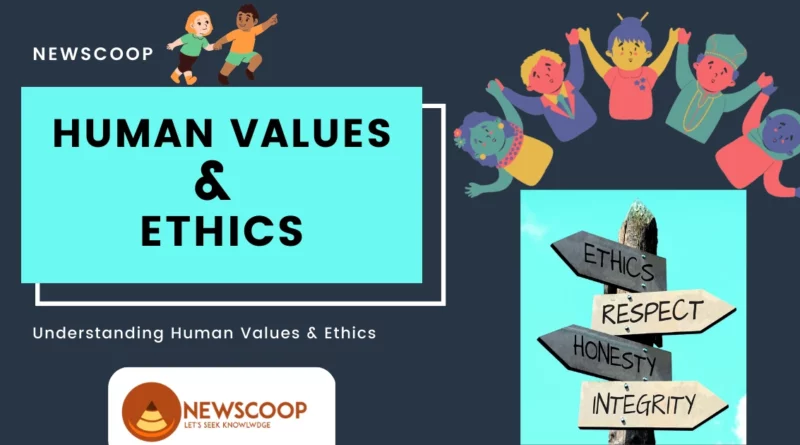Human Values and Ethics: Complete Notes [100%]
Human Values and Ethics are two closely related concepts that are fundamental to our understanding of what it means to be human. Human values are the principles and beliefs that guide our behavior and decision-making, while ethics are the moral principles that govern our actions and interactions with others.
Together, human values and ethics help us to navigate the complex social and moral landscape that we inhabit, and to make meaningful and responsible choices in our personal and professional lives. In this article, we will cover all the aspects of Human Values and Ethics for UPSC.
Why do Human Values and Ethics Matter?
There are many reasons, but some of the most important include:
- They provide a framework for ethical decision-making, helping us to determine what is right and wrong, and to act in accordance with our principles and beliefs.
- They promote social harmony and cooperation by fostering trust, empathy, and mutual respect.
- They help to prevent or mitigate conflicts and social problems by encouraging individuals and groups to work together towards shared goals and values.
- They contribute to personal and collective well-being by providing a sense of purpose, meaning, and fulfillment in life.
Understanding Human Values
What are Human Values?
Human values are the beliefs and principles that individuals and communities hold to be important, desirable, and worthwhile. These values guide our behavior and decision-making, and help us to navigate the complex social and moral landscape that we inhabit.
Importance of Human Values
The importance of human values cannot be overstated. Human values are the foundation of our personal and collective identity, and they play a critical role in shaping our relationships, our communities, and our societies. They help us to define what is important and meaningful in life, and they provide a sense of purpose and direction for our actions and decisions.
Types of Human Values
There are many different types of human values, but some of the most common include:
- Honesty and integrity
- Respect for others
- Responsibility and accountability
- Compassion and empathy
- Courage and resilience
- Fairness and justice
- Tolerance and diversity
- Creativity and innovation
- Wisdom and knowledge
Examples of Human Values
Examples of human values in action might include:
- Speaking up for what is right, even when it is difficult or unpopular
- Treating others with kindness and respect, regardless of their background or beliefs
- Taking responsibility for one’s actions and decisions, and holding others accountable as well
- Showing empathy and understanding towards those who are suffering or in need
- Demonstrating courage and resilience in the face of adversity or challenge
- Striving for fairness and justice in all areas of life, and advocating for those who are marginalized or oppressed
- Embracing diversity and tolerance, and celebrating the unique contributions that each individual can make to society
- Pursuing knowledge and wisdom, and using creativity and innovation to solve complex problems and create a better future.
Ethics & Morality
Ethics and morality are closely related concepts that are often used interchangeably. However, there are some important differences between the two. Ethics refers to the study of moral principles and values, and the application of those principles to specific situations and actions.
Morality, on the other hand, refers to the set of beliefs and practices that govern our behavior and interactions with others.
What is the Relationship between Human Values and Ethics
The relationship between ethics and human values is also important to understand. Human values provide the foundation for ethical decision-making, guiding individuals and groups towards actions and behaviors that are consistent with their beliefs and principles.
Ethics, in turn, help us to apply those values to specific situations and actions, and to make judgments about what is right and wrong.
There are many different approaches to ethics, each with its own strengths and weaknesses. Some of the most common ethical frameworks include:
- Deontological ethics, which emphasizes the importance of following moral rules and duties, regardless of the consequences.
- Consequentialist ethics, which focuses on the outcomes or consequences of actions, and seeks to maximize the overall good.
- Virtue ethics, which emphasizes the development of moral character and the cultivation of virtues such as honesty, courage, and compassion.
Examples of Ethical Dilemmas
Ethical dilemmas can arise in many different contexts, and can be difficult to navigate. Some examples of ethical dilemmas might include:
- Deciding whether to speak out against a superior who is engaging in unethical behavior.
- Choosing between the needs of different stakeholders in a business or organizational context.
- Balancing the interests of individual patients with the needs of the broader healthcare system.
- Determining the appropriate response to situations involving discrimination, harassment, or other forms of misconduct.
Human Values & Business
| Human Values and Business | |
|---|---|
| The importance of human values in business | – Helps to build trust and credibility with customers, employees, and stakeholders. |
| – Fosters a positive and ethical corporate culture that promotes personal and collective well-being. | |
| – Contributes to long-term success and sustainability by aligning business goals with societal needs and values. | |
| Examples of companies with strong values | – Patagonia: A clothing company that prioritizes environmental sustainability and social responsibility. |
| – Salesforce: A technology company that emphasizes ethics, transparency, and employee well-being. | |
| – The Body Shop: A beauty company that promotes fair trade, animal welfare, and environmental protection. | |
| The role of leadership in promoting values-based cultures | – Leaders play a critical role in setting the tone and values of the organization, and in ensuring that those values are upheld. |
| – Leaders can promote values-based cultures by modeling ethical behavior, communicating clear expectations, and holding others accountable. | |
| – Leaders can also encourage innovation and collaboration by fostering a sense of purpose, meaning, and fulfillment among employees. |
Ethics in Society
Ethics are the moral principles that govern our behavior and interactions with others. They help us to distinguish between right and wrong, and guide us in making responsible decisions that have a positive impact on society.
Moreover, Ethics are essential to the functioning of any society, as they provide the framework for creating a just, equitable, and harmonious community.
1. Positive Impact of Ethical Behavior
- Ethical behavior has a positive impact on society in many ways.
- It helps to build trust, cooperation, and respect among individuals and groups, and promotes a sense of fairness and justice.
- Ethical behavior also encourages individuals to take responsibility for their actions and decisions, and to consider the needs and perspectives of others.
2. Negative Impact of Unethical Behavior
- On the other hand, unethical behavior can have a negative impact on society.
- It can erode trust and respect, create conflicts and tension, and undermine the foundations of social and political institutions.
- Unethical behavior can also lead to corruption, exploitation, and abuse of power, which can harm individuals and communities.
3. Examples of Societal Problems Caused by Lack of Ethics
- Corruption
- Discrimination
- Environmental degradation
- Inequality and injustice
Ethics are essential to the functioning of any society, as they provide the framework for creating a just, equitable, and harmonious community. Ethical behavior has a positive impact on individuals and communities, while unethical behavior can lead to societal problems such as corruption, discrimination, environmental degradation, and inequality.
To promote ethical behavior in society, it is important to prioritize education, and to provide individuals with the knowledge, skills, and values needed to make responsible decisions and to contribute to the common good. By working together to promote ethical behavior, we can create a better, more just, and more equitable society for all.
Challenges to Upholding Human Values and Ethics
Upholding human values and ethics can be challenging in many situations, due to a variety of factors. Some common challenges include:
- Pressures to prioritize personal gain over ethical considerations
- Difficulties in navigating complex ethical dilemmas
- Lack of awareness or education on ethical issues
- Cultural or societal norms that conflict with ethical standards
Incentives can play a role in promoting ethical behavior, by rewarding individuals and organizations that prioritize ethical considerations. This can include financial incentives, such as bonuses or promotions, or non-financial incentives, such as recognition or reputation.
However, there are also examples of ethical failures in business and politics, where individuals or organizations have prioritized personal gain over ethical considerations. These failures can have serious consequences, such as financial losses, reputational damage, or harm to individuals or communities.
Examples of such failures include the Enron scandal, the Volkswagen emissions scandal, and political corruption scandals in various countries.
Overall, upholding human values and ethics requires ongoing effort and commitment from individuals and organizations, and a willingness to prioritize ethical considerations over personal gain.
Conclusion
In conclusion, human values and ethics play a critical role in shaping our society, our businesses, and our personal lives. Upholding ethical standards requires ongoing effort and commitment, as well as a willingness to prioritize ethical considerations over personal gain.
The importance of ethical behavior cannot be overstated, as it contributes to trust, respect, and cooperation, and helps to build a more just and equitable society. Therefore, it is essential for individuals and organizations to prioritize ethical behavior and commit to promoting and maintaining ethical standards. By doing so, we can create a better future for ourselves and for future generations.
Thank You!

